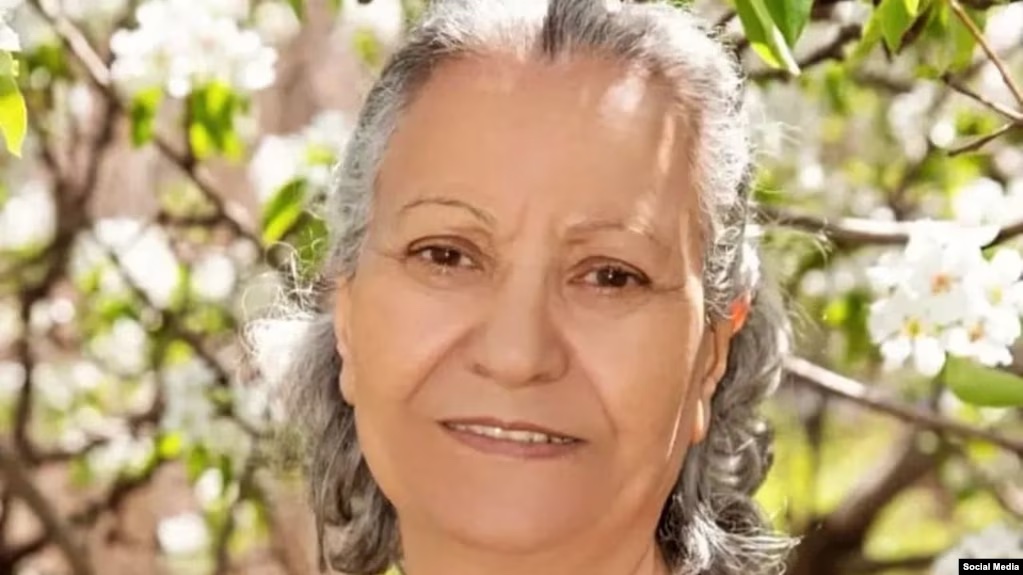Source: www.iranintl.com
Translation by Iran Press Watch

Tehran University Medical School has refused to receive the body of Afagh Khosravizand, a deceased Baha’i citizen. This is in contrast to their previous agreement to honor the family’s decision to donate Ms. Khosravizand’s body to the medical school. Kamran Rahimian, the son of Afagh Khosravizand, reported that his mother’s body was instead buried in a mass grave in Khavaran cemetery without the family’s knowledge or permission.
On Thursday, December 14th, Kamran Rahimian announced on his Instagram: “Contrary to our family’s heartfelt wishes, and despite the university’s initial agreement, they reversed their decision, stating, ‘this family is not reliable and will cause trouble for the university. There is no notarized document. Since several days have passed since the death, the university claims they do not need the body, asserting that it is infected.’ Afagh was laid to rest near our father in Khavaran without our family in attendance.”
Kamran Rahimian had been imprisoned for several years starting in 2011, along with his wife, Faran Hessami, and his brother, Keyvan Rahimian for teaching at the Baha’i Institute for Higher Education (BIHE). In his statement Kamran referred to Khavaran as a symbol of standing up for beliefs and wrote: “Remember…”
Afagh Khosravizand (Rahimian) had been hospitalized in the ICU since November 13th, 2023, due to a severe lung infection. She passed away on Tuesday, November 21st, 2023.
Following her death, authorities denied her family’s right to bury her in “Golestan Javid”, a Baha’i cemetery in Tehran. The family were instead told to bury their mother’s body in the Khavaran cemetery mass grave.
Khosravizand’s children refused to consign their mother to this mass grave. Instead, they decided to donate her body to Tehran University Medical School. In announcing their intent, they said they chose to do so “to maintain the independence of the Baha’i community,” “to respect the sanctuary of Khavaran’s cemetery,” and “to honor their mother’s ‘love of learning’.” They were initially granted permission for this donation from the medical school.
Baha’is in Iran have endured continuing violations of their civil right since the Islamic Revolution. Denying Baha’is to bury their dead properly, in their own cemeteries in accordance with Baha’i burial law is just one of the many examples of oppression and persecution of the Baha’i community at the hands of the Islamic Republic.
The Baha’is have always refused to bury their dead in the mass graves of Khavaran.
Activists of the Baha’i community as well as human rights organizations have issued several reports in the past year, of multiple instances of authorities of the Islamic Republic prevented the burial of deceased Baha’is in Tehran’s Baha’i cemetery, “Golestan Javid”. There have been several instances of authorities burying deceased Baha’is in Khavaran Cemetery without informing their families.
Khavaran Cemetery is also the burial place of those executed in the 1980s, especially the victims of large-scale political executions in 1988.
The Baha’i activists believe that the burial of the deceased Baha’is in Khavaran cemetery is done by the government not only with the aim of persecuting the Baha’is, but also order to distort the effects of the mass burial of those executed in this cemetery.
Rahim Rahimian, Afagh Khosravizand’s husband, was among those executed by gunshot in March 1984, simply for being a Baha’i. Officials never handed over his body to the family and it is believed that that he was buried in the Khavaran cemetery along with other victims of execution.
In a statement on December 4th, 2023, the Baha’i International Community (BIC) went over the “new and much harsher methods” that “the Islamic Republic is now employing in its efforts to suppress the Baha’is citizens in Iran”.
In this statement, the BIC considered the donation of Afagh Khosravizand’s body for medical research as the last action of a woman who lost her husband to execution and had her two sons imprisoned for long sentences, all for being Baha’i.
On Tuesday, November 28th, 14 female political prisoners issued a letter from Evin Prison in which they expressed their sympathy to Afagh Khosravizand’s family and narrated the suffering and endurance of this Baha’i citizen in Iran under the rule of the Islamic Republic.
In their letter, a copy of which was obtained by Iran International, these 14 women political prisoners addressed Afagh Khosravizand’s family and relatives in their letter: “We hope that her release from the suffering and hardship of this life and her fruitful life of perseverance will comfort your hearts.”
Unofficial sources say that more than 300,000 Baha’i citizens live in Iran, but the constitution of the Islamic Republic recognizes only Islam, Christianity, Judaism and Zoroastrianism.
Baha’is are the largest non-Muslim religious minority in Iran, who have been systematically persecuted since the Islamic Revolution of 1979 and the establishment of the Islamic Republic.
Leave a Reply